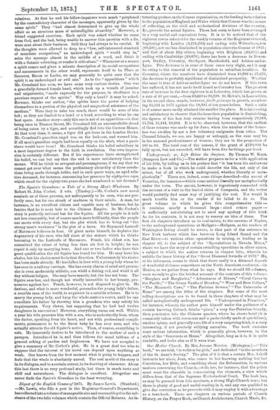The Squire's Grandson : a Tale of a Strong Man's
Weakness. By Robert St. John Corbet. 3 vols. (Tinsley.)—Mr. Corbet's new novel reminds us of those persons, not unfrequently to be seen, who are per- fectly sane, but for one streak of madness in their minds. A man, for instance, is an excellent citizen and capable man of business, but he fancies that he is next heir to the Chinese Empire. So Mr. Corbet's story is perfectly rational but for the Squire. All the people in it talk not less reasonably, but of course mach more brilliantly, than the people one meets with every day, but the plot which has to bring out "the strong man's weakness " is the plot of a farce. Sir Raymond Luttrell of Maramere believes in bone. Of giant make himself, he deplores the degeneracy of his race, who fall short of the stature which he thinks becoming to the Luttrells of Marsmore. Frank, his eldest son, has committed the crime of being less than six feet in height ; he can repair it only by marrying bone. And one or two ladies who have this great qualification the old Squire has found for him. He may have his -choice, but his choice must be in that direction. Unfortunately his choice has been made already. He has fallen in love with a young lady whom he has seen in a railway carriage. She has every charm of mind and person; -she is even moderately athletic, can wield a fishing rod, and wield it all day without fatigue. She may have muscle, but she has not bone. The Squire sees her, and though not wholly insensible to her beauty, pro- nounces against her. Frank, however, is not disposed to give in. He devises, and what is more wonderful, persuades the young lady's father, a sensible man of the world, to acquiesce in a notable scheme. He is to marry the young lady, and keep the whole matter a secret, until he can conciliate his father by showing him a grandson who may satisfy his requirements. Very clever, but supposing that he had had twelve daughters in succession l However, everything tarns out well. Within a year his wife presents him with a son, who is undoubtedly bone, whom 'the doctor, speaking from his heart, and not with professional compli- ments, pronounces to be the finest baby he has ever seen, and who actually attracts the old Squire's notice. Then, of coarse, everything is safe. He innocently desires to be introduced to the mother of such a paragon. Introduced he is, and then follows the usual tableau of a general asking of pardon and forgiveness. We have not scrupled to give a summary of Mr. Corbet's plot. He is a great deal too wise to suppose that the interest of his novel can depend upon anything so weak. One knows from the first moment what is going to happen, and feels that the whole is absolutely unreal The real merit of the story is in its dialogue, and to a certain extent, in its drawing of character. About this last there is no very profound study, but there is much taste and skill and naturalness. The dialogue is excellent. Altogether one never finds the Squire's Grandson in the least wearying.






























 Previous page
Previous page